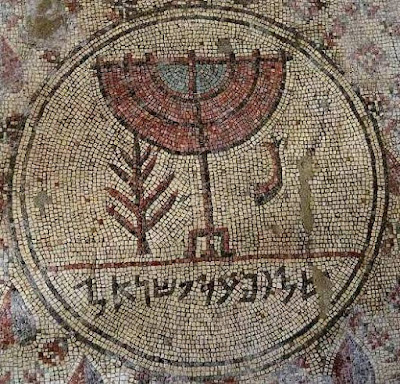by Rav Netanel Yosifun, translated by Hillel Fendel
On the outskirts of the city of Jericho (about 25 kilometers east of Bet El), may it soon be rebuilt, stands the site of the Shalom al Yisrael synagogue. It is famous for its age – about 1,400 years old – and for its large, beautiful mosaic floor; the 1,400 square foot mosaic, featuring a menorah and other Jewish symbols, was uncovered in a 1936 archaeological dig.
Unfortunately, the Oslo Accords gave Jericho over to Palestinian Authority control, leaving Israel with only a minor measure of control over the synagogue. A yeshiva was allowed to function on the second floor of the building, while the ground floor – with the precious mosaic floor – was handed over to the responsibility of a local Arab. In 2001 Arabs vandalized and set the building on fire, although the Torah scroll had been locked in a safe and was not damaged.
Of late, weekly prayers are permitted at the site, with special IDF-PA coordination. On one of these occasions, I stood outside in the courtyard, and my ears caught a lively conversation between two of the regular weekly worshipers. One said: "Our goal must be to restore Jewish control to the ground floor. The mosaic is like an imprint on the earth left behind by our ancestors, proof of our national rights to our hold land. The mosaic seal must be foremost in our goals!"
Answered the second: "We don't need seals and imprints. Our rights to this Land did not start with our ancestors, but rather with the Holy One, Blessed be He, Who gave it to us. The Divine promise is stronger than any human act."
Who is right? This question takes on added significance this week when we read the Torah portion of Hayei Sarah, which recounts the purchase of the Machpelah Cave in Hevron. Why did Avraham have to buy it, if the entire land had already been Divinely promised to him and his descendants?
Keep in mind that this was the first official Jewish acquisition of property in the Holy Land. The Midrash (B'reshit Rabba 79,7) says the following:
Keep in mind that this was the first official Jewish acquisition of property in the Holy Land. The Midrash (B'reshit Rabba 79,7) says the following:
"There are three places that the gentiles cannot defraud Israel and claim that we stole them: the Machpelah Cave, the Holy Temple and the grave of Yosef. The Machpelah Cave – as is written, “Avraham listened to Ephron, and weighed out to [him] the silver…” (B'reshit 23,16)…"
Each of these three places was purchased outright by Jews, representatives of the nation, as the Bible recounts in different places – and therefore no one can claim that they are not ours.
Most puzzlingly, the famous words of our classic commentator Rashi on the first verse in the Torah seem to contradict this Midrash. Rashi says that the Land of Israel in its entirety belongs to the Jewish Nation, and that no one can deny this because of the very fact that the Torah begins with the story of Creation - showing all who read it that G-d created the world and can give any part of it to whomever He wants – as He did with the Holy Land, giving it to the Jewish people.
Most puzzlingly, the famous words of our classic commentator Rashi on the first verse in the Torah seem to contradict this Midrash. Rashi says that the Land of Israel in its entirety belongs to the Jewish Nation, and that no one can deny this because of the very fact that the Torah begins with the story of Creation - showing all who read it that G-d created the world and can give any part of it to whomever He wants – as He did with the Holy Land, giving it to the Jewish people.
If so, why did Avraham bother buying the Machpelah Cave? Was any concrete Jewish ownership needed in the face of a Divine promise?
The answer is rooted in an important principle of emuna, explained at length in the famous work Nefesh HaChaim and others. G-d certainly acts in the world – but He deposits in the hands of mortal beings the manner in which He and His actions are revealed.
We read in Psalms (121,5), "G-d is your shadow" – indicating that just like a person can cause his shadow to "move" simply by moving his hand, head, or body, so too, we can "move" G-d: He will act in the world in the manner in which we act.
Yes, the Land of Israel belongs to the People of Israel by virtue of the Divine promise – but it is incumbent upon us, the People of Israel, to walk in the path of our Patriarch Abraham and actualize this right and ownership. Every time we build a home in Israel, or expand an existing one, or otherwise settle in the Land – this adds to our ownership and rights to the Holy Land.

No comments:
Post a Comment